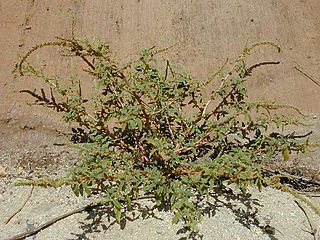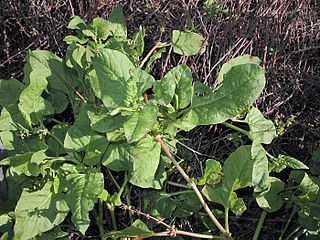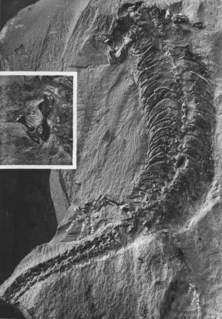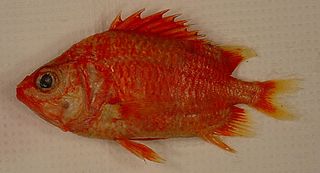
The mandibular nerve (V3) is the largest of the three divisions of the trigeminal nerve, the fifth cranial nerve (CN V).

The spur-winged lapwing or spur-winged plover is a lapwing species, one of a group of largish waders in the family Charadriidae.

Amaranthus spinosus, commonly known as the spiny amaranth, spiny pigweed, prickly amaranth or thorny amaranth, is a plant is native to the tropical Americas, but is present on most continents as an introduced species and sometimes a noxious weed. It can be a serious weed of rice cultivation in Asia.

The meningeal branch of the mandibular nerve is a branch of the mandibular nerve that supplies the dura mater.

Fischer's guiara, is a spiny rat species from South America. It is found in Argentina, Brazil and Paraguay. It is one of only two species in the genus Euryzygomatomys.
Neacomys spinosus, also known as the common neacomys, common bristly mouse, or bristly mouse, is a nocturnal rodent species from South America in the genus Neacomys. It is found in Bolivia, Brazil, Colombia, Ecuador and Peru, where it often lives in transition areas between lowland forest and open regions. Its diet consists of insects, seeds and fruit.
The genus Neacomys, also known as bristly mice because of their spiny fur, includes several species of rodents in the tribe Oryzomyini of family Cricetidae. It is most closely related to Oligoryzomys, Oreoryzomys, and Microryzomys. Neacomys species are mainly found in the Amazon basin, but N. pictus occurs in Panama and N. tenuipes in montane Colombia. In Amazonia, there is a single large species, N. spinosus, and a number of smaller ones, including N. dubosti, N. guianae, N. paracou, N. minutus, N. musseri, N. rosalindae, N. macedoruizi, and various others that remain undescribed.

The spiny crag lizard or prickly girdled lizard is a species of lizard in the family Cordylidae. There is ongoing debate as to whether it belongs to the genera Pseudocordylus or Cordylus.

Rumex spinosus, commonly known as devil's thorn or lesser jack, is an annual herbaceous plant of the Polygonaceae. It originates in the warmer parts of the old world, but now has spread with humans to other places. It is common in disturbed areas, especially in sandy soils. It has shown some weedy behaviour in restricted areas within southern Australia.

Psorothamnus spinosus, known as the smokethorn, smoketree, smoke tree, smokethorn dalea, and corona de Cristo, is a perennial legume tree of the deserts in North America.

Ceanothus spinosus, with the common names greenbark and redheart, is a species of Ceanothus. It is native to southern California and northern Baja California, where it grows in the scrub and chaparral of the coastal mountain ranges.

The rosette-nosed chameleon is a small species of chameleon found in virgin forest and woodland of both the eastern and western Usambara Mountains in Tanzania. This endangered species is predominantly ash-grey in colouration, with a distinctive rosette-like nasal appendage.

Sauravus is an extinct genus of nectridean lepospondyl within the family Scincosauridae.
C. spinosus may refer to:

Stenopus spinosus is a shrimp-like decapod crustacean belonging to the infraorder Stenopodidea.

The spinycheek soldierfish is a species of soldierfish found in the Atlantic Ocean at depths of 45 to 275 metres. This species grows to a length of 20 centimetres (7.9 in) TL. It is the only known member of genus Corniger.

Chilomycterus is a genus of diodontid tetraodontiform fishes commonly called "burrfish."
Grynex lineatus is a species of beetle in the family Cerambycidae. It was described by Francis Polkinghorne Pascoe in 1888.
Grynex martini is a species of beetle in the family Cerambycidae. It was described by Allard in 1894. It is known from Australia.
Aspergillus spinosus is a species of fungus in the genus Aspergillus. Aspergillus spinosus produces aszonalenins, 2-pyrovoylaminobenzamide, fumigachlorin and pseurotins.















